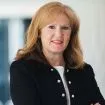In honor of its 40th anniversary, Venable Foundation director Michael Bigley recently sat down with Lindsay Meyer, president of the board of the Foundation, to discuss the Foundation's history, evolution, and key initiatives. As Lindsay prepares to step down from her role as president, she also reflects on her tenure, contributions, and hopes for the future. Read the full Q&A with Michael and Lindsay below.
Michael: How long have you been with the firm, and what's kept you here since you joined?
Lindsay: I joined Venable in 1987 as a first-year associate in the Tysons Corner, Virginia office. I was a litigator for the first two and a half years before transitioning to the DC office, when we started an international trade practice. I was looking for a firm where I could grow as a lawyer and get engaged with the community—my office community, the firm community, and then the larger community, the city that I have come to know and love.
I became an international trade lawyer because I've always been interested in the larger issues of the world. Well, those very same issues exist in our own communities, so my involvement in the Venable Foundation has been a really nice grounding point for me. I knew that through the work of the Foundation, we were also paying very close attention, as a firm, to looking after those in need in our own neighborhoods.
Michael: When did you first get involved with the Venable Foundation, and how has that influenced your career?
Lindsay: Even as a young associate in Venable's Virginia office, I saw that the office leaders were very strongly committed to giving back to the community. It was an extension of the values that I had consistently heard about from former Venable leaders, like Ben Civiletti, Jim Shea, Bill Dolan, and John Milliken. In early 2014, when then Venable chairman Jim Shea became aware of John Milliken's retirement, he recruited me to join the Foundation, with the plan of stepping up as Foundation president the following January. I essentially had one year to learn the ropes before taking over as the third president of the Venable Foundation in January of 2015, following in the very large footsteps of Ben Civiletti and John Milliken.
Michael: Looking back at your tenure as you are nearing retirement, are there any accomplishments that you are particularly proud of now?
Lindsay: For me, it starts and ends with the impact grants. Around 2017, we began making annual above-and-beyond contributions focused on addressing a specific area of need in the community. Prior to these impact grants, I felt that we had been more reactive, but portioning off some of our grant funds to more substantial impact grant amounts has really been rewarding.
I think people can appreciate when they see a large and significant chunk of money go to an issue of particular focus, like homelessness last year, or like bridging the educational divide during the pandemic. These focused impact grants have allowed us to tackle timely and important issues on a larger scale and more meaningfully than we have been able with our historic grants. I'm also very proud that the engagement of attorneys and staff has grown exponentially during my tenure.
Michael: In your opinion, what's the impact of the Foundation on the overall culture here at Venable?
Lindsay: The internal impact is huge. I think it's a draw to lateral partners, and it distinguishes Venable from nearly every other law firm, because no other firm reaches the level of giving that we have sustained over the last 40 years. It's what initially drew a homegrown lawyer like me to Venable, and it's one of the important factors that has kept me here, in addition to my fabulous colleagues, of course!
So often our profession is denounced as greedy, and I think the Foundation demonstrates by its actions that Venable believes in every person and in our communities, where we can not only perform legal services, but also contribute to humanitarian efforts by funding phenomenal organizations. The Foundation also reflects on each of us as individuals. Sure, our day job is practicing law, but we all have other interests and areas where we want to engage. As lawyers, the Foundation provides a nice opportunity to round out our professional careers.
Michael: Looking forward, how do you see the work of the Foundation evolving after you step down as president?
Lindsay: As we approach the 40th anniversary, I'm delighted to be in a position to pass the baton as president, knowing that the Venable Foundation is strong. However, I am also mindful of the importance to regularly review the program and refresh the representation on the Grants Committee, especially as we continue to grow our offices. Here, I expect that to occur naturally, as it does with the firm's growth—we continue to have new donors and new opportunities and communities to support.
It's equally important to ensure that we—as the Grants Committee and certainly as the board—are performing as competent trustees to our donors. We serve as representatives of our donors, and we want to make sure that we are listening carefully and are acting responsibly in a manner that sustains the Venable Foundation and continues this historic legacy for the next 40-plus years.
The content of this article is intended to provide a general guide to the subject matter. Specialist advice should be sought about your specific circumstances.


